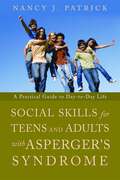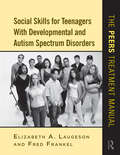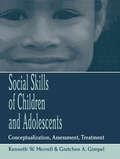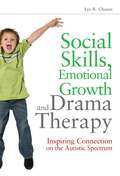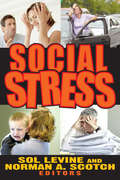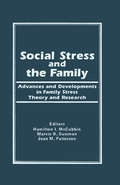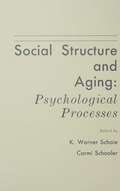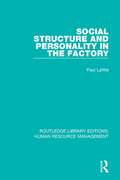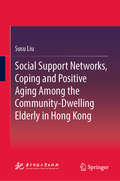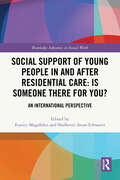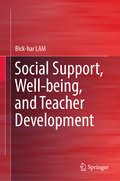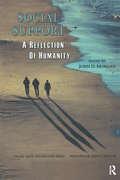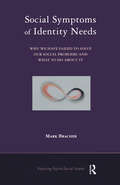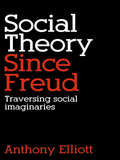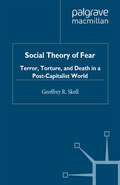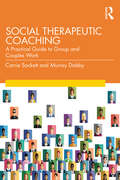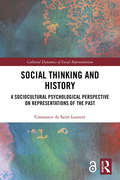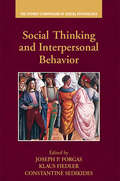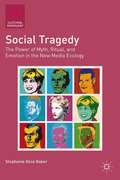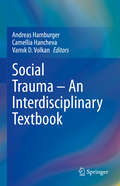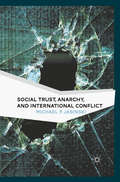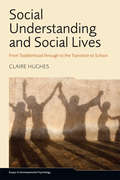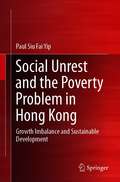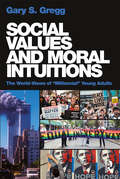- Table View
- List View
Social Skills for Teenagers and Adults with Asperger Syndrome: A Practical Guide to Day-to-Day Life
by Nancy J. PatrickThis resource provides practical strategies for helping teenagers and adults with Asperger Syndrome to navigate social skills, friendships and relationships at home and in the community. The author offers advice and useful strategies for tackling day-to-day problems such as visits to the dentist or the doctor, searching for a job, sorting out personal finances, going on vacation, and dealing with public transport, as well as more intimate topics such as dating and acquiring and maintaining friendships. The chapters are structured around real-life scenarios and the challenges they present, followed by step-by-step solutions and suggestions. A final section provides a set of practical self-help tools, which encourage the reader to note down answers to the questions posed and record personal reflections. This accessible guide will be essential reading for teenagers and adults with Asperger Syndrome and their families, teachers, therapists, counsellors, carers, social and health work professionals.
Social Skills for Teenagers with Developmental and Autism Spectrum Disorders: The PEERS Treatment Manual
by Fred Frankel Elizabeth A. LaugesonThis book is essential reading for any clinician or researcher working with teens with autism spectrum disorders. This parent-assisted intervention for teens is based on a comprehensive, evidence-based, 14-week program at UCLA’s Semel Institute for Neuroscience and Human Behavior, the manualization of the popular UCLA PEERS Program, and the success of the Children’s Friendship Training (Routledge, 2002) manual for children. After reviewing techniques designed to help parents and therapists tailor the manual to the needs of the teens with whom they are working, the text moves on to the individual treatment sessions and strategies for tackling issues such as developing conversational skills, choosing friends, using humor, get-togethers, teasing, bullying, gossiping, and handling disagreements. Each session chapter includes handouts, homework assignments, descriptions of what to expect (and how to handle challenges in delivering the intervention), and customized tips for both parents and therapists.
Social Skills of Children and Adolescents: Conceptualization, Assessment, Treatment
by Kenneth W. Merrell Gretchen GimpelThis scholarly yet highly readable and practical text systematically covers the importance, development, assessment, and treatment of social skills of children and adolescents. Combining scientific rigor with a highly approachable and readable style of writing to create a practical and unique book, this volume provides a comprehensive overview of the increasingly important topic of child and adolescent social skills. A wide variety of tables, figures, and practical step-by-step guides enhance the material presented, making it particularly useful for practitioners while offering an extensive array of recent research and models of interest to researchers. The authors present a solid foundation of scientific knowledge written in a manner accessible to nonscientists and having ample practical implications and examples for educational and clinical practice. The book is divided into two parts--the first features a foundation for conceptualizing and assessing child and adolescent social skills, whereas the second focuses on the arena of intervention. An up-to-date and unique addition to the literature, this volume will be of interest to professionals who work with or study children across several disciplines including school and clinical child psychology, special education, counseling, and social work. Although many books and other professional materials on the social competence of children and adolescents are presently available, the knowledge regarding these social skills is expanding rapidly, and there is a tremendous need to keep it current. This book helps meet this need by not only synthesizing a great deal of recent work in the field, but also by providing new information and evidence that has not yet been published. It also bridges an important gap that sometimes exists between research and practice. For instance, some books on child and adolescent social skills are clearly written for the academician or researcher, and may have little apparent application for the clinician or practitioner. Other materials are written as practical assessment or intervention guides for the clinician/practitioner, yet sometimes lack supporting evidence and rationale. This book is aimed at both arenas.
Social Skills, Emotional Growth and Drama Therapy
by Lee R. ChasenDrama therapy provides valuable opportunities for children on the autism spectrum to interact and connect with others in a fun, supportive environment. The innovative model of drama therapy described in this book is rooted in neuroscience, and designed specifically to develop social, emotional and expressive language skills in children with autism spectrum disorders (ASD). Lee R. Chasen provides an accessible explanation of the theoretical foundations, concepts and techniques that make up the approach, and describes in detail a thirty-session drama therapy program which uses creative and playful tools such as guided play, sociometry, puppetry, role-play, video modeling and improvisation. Scenarios drawn from his own practice provide useful insights into the practicalities of setting up and running such a program, as well as into how children's social, emotional and expressive language skills deepen through their immersion in this unique approach. This book will be of interest to drama and creative arts therapists, as well as teachers, school psychologists, counsellors and other professionals who work with children with autism spectrum disorders.
Social Stigma: The Psychology of Marked Relationships
by Edward E. JonesSocial Stigma: The Psychology of Marked Relationships.
Social Stress
by Levine SolPhysicians are not alone in their concern with stress. Other professionals, such as psychologists and social workers, invoke stress to explain social pathology, for example, alcoholism, suicide, and drug abuse. They are joined by additional individuals in implicating stress in the development of disease. Indeed, conventional wisdom has long noted that to worry, be tense, or take things hard, is to increase one's vulnerability to disease.Sol Levine and Norman A. Scotch argue that whether the focus upon stress is in its origins and its management, or upon its relationship to individual pathology and behavior, it is necessary to appreciate its complexity and its various dimensions. In particular, they discuss and answer the following common questions: To what extent do various work and organizational settings engender stress for various occupants? To what degree does upward and downward social mobility create stress? What are the effects of family disruptions—death, divorce, or desertion—upon the psychological state of the individual?This book presents a clear and comprehensive picture of the phenomena encompassed within the conceptual rubric of stress and to explicate such specific levels or dimensions as the sources of stress, its management, and its consequences. The contributors are top researchers from the fields of sociology, anthropology, psychology, and medicine. They include Sydney H. Croog, Edward Gross, Barbara Snell Dohrenwend, Bruce P. Dohrenwend, Richard S. Lazarus, Andrew Crider, John Cassell, E. Gartly Jaco, James E. Teele, Robert Scott, and Alan Howard. The work concludes with a statement by the editors summarizing the data and themes that are presented throughout the work. This work should be read by all individuals. In particular, it will be invaluable for sociologists, psychologists, and professional social scientists.
Social Stress and the Family: Advances and Developments in Family Stress Therapy and Research (Marriage And The Family Ser. #Vol. 6, Nos. 1-2)
by Marvin B Sussman Hamilton I Mc CubbinAn informative anthology of recent theory and research developments pertinent to family stress.
Social Structure and Aging: Psychological Processes (Social Structure and Aging Series)
by K. Warner Schaie Carmi SchoolerThis volume presents a systematic examination of the impact of social structures on individual behaviors and on their development in adulthood and old age. These papers and responses attempt to improve the reciprocal relationship between changes in social macro- and micro-structures and the process of psychological development in relation to issues of human aging. Using and combining concepts and data from various fields, this research promotes a better understanding of the effects of demographic patterns and social structures on the psychological development of adults.
Social Structure and Personality in the Factory (Routledge Library Editions: Human Resource Management #23)
by Paul LafitteThis study, first published in 1958, explores the behaviour of industrial workers in a social context. By interviewing and observing workers in factories in Melbourne, the author examines the worker’s evaluation of work, work satisfaction, relationships and friendships within the workplace, and the worker’s place in society. This title will be of interest to students of psychology, sociology and business studies.
Social Support Networks, Coping and Positive Aging Among the Community-Dwelling Elderly in Hong Kong
by Susu LiuThe dramatically increasing aging population of Hong Kong has elicited new risks and opportunities to facilitate a positive life for older adults. This book offers a holistic review of gerontological theories and literature, and constructs a conceptual framework of social support networks, coping and positive aging. In light of the implications of the convoy model of social support to depict an indigenous landscape of positive aging in Hong Kong, this is one of the very few empirical studies that adopts both quantitative research and qualitative research. The research consisted of a pilot study of in-depth interviews with 16 older Hong Kong Chinese and a main study surveying 393 older members of District Elderly Community Center. The results of the study indicate that family and peer support constitute the mainstay of support networks of the elderly, and that family and peer support are associated with positive aging. Moreover, the study shows that it is the depth of emotional closeness, namely, close interaction and intimacy with social partners that makes the greatest contribution to positive aging. Additionally, problem coping and emotion coping are found to mediate the relationship between social support networks and positive aging. There is potential in bringing more domestic helpers into elderly care and improving the service quality such that the goal of Aging in Place can be promoted in Hong Kong. Intended for researchers in social work, gerontology and positive psychology, it is also essential reading for graduates and social work professionals interested in this area. This book makes a valuable contribution to social gerontological research among Hong Kong older adults and the promotion of wellbeing in the elderly via the construct of positive aging in the culture of Chinese society.
Social Support of Young People in and after Residential Care: An International Perspective (Routledge Advances in Social Work)
by Eunice Magalhães Shalhevet Attar-SchwartzDecades of research highlight the protective tole of strong, positive, and secure relationships for children and young people at risk, both in the community and in out-of-home care.This volume offers an in-depth exploration of social support among young people in residential care and after leaving care, emphasizing its role in their well-being. Drawing on research from Australia, Brazil, Canada, Ghana, India, Ireland, Israel, Norway, the Netherlands, Portugal, Spain, and the United States, the contributions in this collection focus on the residential care setting while offering insights relevant to other out-of-home care contexts, such as foster care and educational residential facilities. Academics and professionals working in social work, education, child protection, and child psychology will find this book a valuable resource.
Social Support, Well-being, and Teacher Development
by Bick-Har LamThis book uses social support as a central theme to provide a sound underpinning for guiding teachers to play more supportive roles in schools. It comprises a series of empirical studies that address the psychological processes involved in feeling supported and providing support, and which demonstrate how students’ and teachers’ well-being can be enhanced through learning and teaching in the classroom.The distinction between teachers who are caring mentors and those who simply impart knowledge has attracted considerable interest among researchers; however, in the twenty-first century education seems to be playing a more restricted role, due to the predominant focus on performance outcomes. This book addresses and identifies teachers’ expanding role in education. It describes various types of support that teachers can offer students, and which serve to enhance a range of learning outcomes. Further, it provides evidence suggesting that teachers’ commitment to learner development is a prerequisite for a satisfying teaching career, and that teachers’ knowledge, skills and ability to provide social support in the classroom form a pathway of professional learning that can take their teaching expertise to a higher level. Lastly, the book offers policymakers suggestions on how to rekindle social support in an increasingly globalised setting in which people are becoming more and more disconnected. Given its multidisciplinary approach, the book is a unique contribution within its subject area, and will be of interest to practitioners in education and beyond.
Social Support: A Reflection of Humanity (Death, Value and Meaning Series)
by John D. MorganNone of us could survive in the workplace, community, or even in our homes, if we allowed everyone to see how truly vulnerable we are. Yet, social support is a necessity if we are to achieve whatever it is we set out to achieve in this life. "No human being is an island unto himself." "Social Support: A Reflection of Humanity" is a "how to" book. In this work, the authors examine the nature of social support, how it can be offered, and how social support differs from other forms of therapy.
Social Symptoms of Identity Needs: Why We Have Failed to Solve Our Social Problems and What to do About It (The\exploring Psycho-social Studies Ser.)
by Mark BracherExplains how our major social problems, including crime, violence, terrorism, war, substance abuse, and prejudice, are the result of efforts by their perpetrators to maintain a secure identity, or sense of self. It locates the root causes of these social problems and counterproductive responses in certain identity-damaging social and cultural phenomena that force identity to defend and maintain itself by socially harmful means.
Social Theory Since Freud: Traversing Social Imaginaries
by Anthony ElliottIn this compelling book, Anthony Elliott traces the rise of psychoanalysis from the Frankfurt School to postmodernism. Examining how pathbreaking theorists such as Adorno, Marcuse, Lacan and Lyotard have deployed psychoanalysis to politicise issues such as desire, sexuality, repression and identity, Elliott assesses the gains and losses arising from this appropriation of psychoanalysis in social theory and cultural studies.Moving from the impact of the Culture Wars and recent Freud-bashing to contemporary debates in social theory, feminism and postmodernism, Elliott argues for a new alliance between sociological and psychoanalytic perspectives.
Social Theory of Fear
by Geoffrey R. SkollA PDF version of this book is available for free in open access via the OAPEN Library platform, www. oapen. org. In the current crisis of the capitalist world system, elites promote fear of crime and terrorism to keep and expand their privileges and control the masses. This book offers an analysis of the crisis and strategies for rebellion. This ebook is participating in an experiment and is available Open Access under the Creative Commons Attribution-Non Commercial-No Derivatives 3. 0 Unported (CC BY-NC-ND 3. 0) licence. Users are free to disseminate and reuse the ebook. The licence does not however permit commercial exploitation or the creation of derivative works without specific permission. To view a copy of this license visit http://creativecommons. org/licenses/by-nc-nd/3. 0
Social Therapeutic Coaching: A Practical Guide to Group and Couples Work
by Carrie Sackett Murray DabbyCombining social therapeutics with the practice of coaching, this book guides coaches and mental health professionals in how to coach groups and couples using this innovative method. Drawing from the authors’ combined 50 years of experience, Social Therapeutic Coaching: A Practical Guide to Group and Couples Work empowers practitioners to break away from focusing on individual change to focusing on groups and their emotional growth. Early chapters touch on the history of coaching and powerful discoveries of social therapeutics before diving into how to lead a social therapeutic group. Sackett and Dabby explain how to incorporate the concept of human relationality into coaching sessions, demonstrating how it extends group work beyond assembling like-minded individuals with similar goals into bringing together diverse people with diverse issues that they want to work on and grow around. It also brings a fresh lens to working with couples, in which the focus is on discovering what "the relationship" needs, rather than trying to get individuals to compromise, change or work towards a preconceived shared vision for an end goal. Written in an accessible style and filled with extensive case studies and examples, Social Therapeutic Coaching provides a powerful toolkit for coaches, counselors, psychotherapists, social workers, HR and talent development professionals, community-based leaders and social entrepreneurs.
Social Thinking and History: A Sociocultural Psychological Perspective on Representations of the Past (Cultural Dynamics of Social Representation)
by Constance De Saint LaurentSocial Thinking and History demonstrates that our representations of history are constructed through complex psychosocial processes in interaction with multiple others, and that they evolve throughout our lifetime, playing an important role in our relation to our social environment. Building on the literature on social thinking, collective memory, and sociocultural psychology, this book proposes a new perspective on how we understand and use our collective past. It focuses on how we actively think about history to construct representations of the world within which we live and how we learn to challenge or appropriate the stories we have heard about the past. Through the analysis of three studies of how history is understood and represented in different contexts – in political discourses in France, by intellectuals and artists in Belgium, and when discussing a current event in Poland – its aim is to offer a rich picture of our representations of the past and the role they play in everyday life. This book will be of great interest toacademics, researchers, and postgraduate students in the fields of psychology, memory studies, sociology, political science, and history. It will also make an interesting read for psychologists and human and social scientists working on collective memory.
Social Thinking and Interpersonal Behavior (Sydney Symposium of Social Psychology)
by Klaus Fiedler Joseph P. Forgas Constantine SedikidesThe connection between mental and social life remains one of the most intriguing topics in all of psychology. This book reviews some of the most recent advances in research exploring the links between how people think and behave in interpersonal situations. The chapters represent a variety of theoretical orientations, ranging from evolutionary approaches through cognitive and affective theories, all the way to considering social and cultural influences on the relationship between social cognition and interpersonal behavior. Given its breadth of coverage, this volume is useful both as a basic reference book and as an informative textbook for advanced courses dealing with social cognition and interpersonal behavior. The main target audience comprises researchers, students, and professionals in all areas of the social and behavioral sciences, including social, cognitive, clinical, counseling, personality, organizational, forensic, and applied psychology, as well as sociology, communication studies, and social work. Written in a readable yet scholarly style, this volume serves as an engaging overview of the field for students in courses dealing with social cognition and social interaction at undergraduate and graduate levels.
Social Tragedy
by Stephanie Alice BakerA social tragedy is a collective representation of injustice. Baker demonstrates how social tragedies facilitate moral action and discusses a series of contemporary case studies - the death of Princess Diana, Zin#65533;dine Zidane's 2006 World Cup scandal, KONY 2012 - to examine their social and political effects.
Social Trauma – An Interdisciplinary Textbook
by Andreas Hamburger Camellia Hancheva Vamık D. VolkanThis book explores the intersection of clinical and social aspects of traumatic experiences in postdictatorial and post-war societies, forced migration, and other circumstances of collective violence. Contributors outline conceptual approaches, treatment methods, and research strategies for understanding social traumatizations in a wider conceptual frame that includes both clinical psychology and psychiatry. Accrued from a seven year interdisciplinary and international dialogue, the book presents multiple scholarly and practical views from clinical psychology and psychiatry to social and cultural theory, developmental psychology, memory studies, law, research methodology, ethics, and education. Among the topics discussed: Theory of social traumaPsychoanalytic and psychotherapeutic approaches to social traumaMemory studiesDevelopmental psychology of social traumaLegal and ethical aspectsSpecific methodology and practice in social trauma research Social Trauma: An International Textbook fills a critical gap between clinical and social theories of trauma, offering a basis for university teaching as well as an overview for all who are involved in the modern issues of victims of social violence. It will be a useful reference for students, teachers, and researchers in psychology, medicine, education, and political science, as well as for therapists and mental health practitioners dealing with survivors of collective violence, persecution, torture and forced migration.
Social Trust, Anarchy, and International Conflict
by Michael P. JasinskiChallenges the democratic peace and diversionary war theories by emphasizing the importance of social trust, its origin as a by-product of effective governance exercised by strong states, and influence on international conflict.
Social Understanding and Social Lives: From Toddlerhood through to the Transition to School (Essays in Developmental Psychology)
by Claire HughesWinner of the British Psychological Society Book Award (Academic Monograph category) 2013! Over the past thirty years, researchers have documented a remarkable growth in children’s social understanding between toddlerhood and the early school years. However, it is still unclear why some children’s awareness of others' thoughts and feelings lags so far behind that of their peers. Based on research that spans an extended developmental period, this book examines this question from both social and cognitive perspectives, and investigates the real-life significance of individual differences in theory of mind. After tracing the key age-related changes in the development of theory of mind, this book examines individual differences in relation to children’s cognitive abilities and their social experiences. Why might language or executive function matter for children’s social understanding? And how do children’s linguistic environments and relationships with parents and siblings contribute to their ability to reflect on people’s thoughts and feelings? The book also reviews the evidence for predictive links between early social understanding and later social behaviour. Using information gathered from classmates, teachers and the children themselves, the author investigates links between individual differences in early social understanding and in the quality of children’s interactions with friends, in their ability to resolve conflict, and in diverse aspects of school adjustment. Drawing on rich observational data gathered in this extended longitudinal study, as well as skills acquired during her early experimental studies of children with autism and a six year collaboration with Professor Judy Dunn, the author integrates both cognitive and social accounts of theory of mind. The book is ideal reading for researchers actively working in the field, graduate and undergraduate students specializing in developmental psychology, educational and health professionals, and parents interested in learning about children’s early social development.
Social Unrest and the Poverty Problem in Hong Kong: Growth Imbalance and Sustainable Development
by Paul Siu YipThis book discusses the policy and public health challenges in Hong Kong from the perspective of economic and social welfare challenges, specifically focusing on the poverty and inequality research supported by the Hong Kong Jockey Club (HKJC) Charities Trust. Conducted by Prof Yip and his research team at the HKJC’s Centre for Suicide Research and Prevention at the University of Hong Kong across a five-year period, the book presents analyses based on high quality statistical data to explore some of the socioeconomic roots of the civil unrest in 2019, while also acknowledging the limitations and challenges of trying to build a stronger society under the constraints of the One Country Two Systems policy. Building on extensive research done by the research team and some governmental data, it provides concrete, evidence-based suggestions for reducing poverty in a high-income society, which are useful not only for Hong Kong but also for other societies experiencing similar challenges. It makes an original contribution to research into inequalities, poverty and social policies, and will be of interest to those seeking to understand the ongoing political challenges in Hong Kong and how they relate to the socioeconomic challenges and policies that affect the everyday lives of ordinary people there. It is relevant to academics, students and policymakers concerned with social inequalities and policy intervention.
Social Values and Moral Intuitions: The World-Views of "Millennial" Young Adults
by Gary S. GreggMillennials have been stereotyped as both "entitled slackers" and "the next greatest generation." This study uses depth interviews to offer a scholarly and balanced account of young adults’ values and world-views. It investigates their views on a wide range of issues, including religion, the economy, politics, gender, ethnicity, and the digital technologies they’ve grown up with. Based on the findings, it revises current theories about the psychological underpinnings of beliefs, especially about the "moral intuitions" that guide Millennials’ thinking. Examining the values they share and the distinctive views of individuals, this fascinating work will interest researchers and students in psychology and related social sciences.
